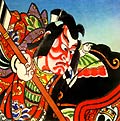 |
KABUKI
 |
The literal meaning of Kabuki in Chinese character is " song, dance
and technique "
The word "kabiki" came from the word "kabuku"which
means 'out of common sence' or 'unrestrained'.
One of the most important traditional performing arts in Japan.
A highly stylized beauty is its big characterristics.

Remark on KABUKI (by Judit, a Hungaryan student 2003) "Before coming to Japan I only knew a couple of things about Japanese theatre. 1. There are 2 traditional forms of theatre: Noh and Kabuki. 2. Both are played only by men. 3. In Noh the actors wear face masks, so their expressions cannot be seen. But I didn`t know anything more about Kabuki. But just until I got the invitation from a really good Japanese friend of mine to go and watch a Kabuki play. The first thing I realized, that it is not cheap, but really expensive. Even the cheaper tickets costed a small fortune. So I was hesitating. But she convinced me, that this play is a unique performance and I should not better miss it, so at the end I said yes. But then another surprise: the performance will be 4,5 hours long! I couldn`t believe it when I first heard it. I imagined myself sitting in a theatre hall for 4,5 hours and watching a play which I cannot understand a word from. That sounded a little tiring... Although I had the possibility to check the story in advance on the Internet, but unfortunately it didn`t cheer me up too much. Because it said, that there will be a princess who has to marry a dog, and then she commits suicide, while she is pregnant. Her babies`s spirits fly away and many years later return to earth as samurais, to make order in the country. So, all in all: expensive tickets, extremely long and strange story and of course in Japanese language. I trusted my friend, when she says to something that it is worth watching or going to, it is definately so. So, I went there though with mixed feelings. When I arrived there I saw many ladies dressed up in beautiful kimonos, and the theatre itself was really nice, with a huge hall and stage. The play started on time, the curtain went up. Beautiful decorations and costumes the actors had. Really colourful and luxurious. In the first 1,5 hours` part the main part of the story was told. Though it was in Japanese I could understand everything which was happening on the stage. Of course without reading the story in advance this could have been more difficult. The whole set was really enjoyable. Different lights, sounds, some songs, and small dances, small fights as well and many actors, who chaged all the time. Also the stage decorations were changed very often. We were in the garden of a house, then inside of the house, then again outside. And the change took place only in couple of seconds! The second part really flew away. I didn`t even realized that it is breaktime again. The real battle had begun. The real enemy was revealed. It was such a spectacle: people coming up and going down again by hidden elevators, the stage itself turns in every directions, even upside down while the actors are still standing on it, again lights, fire, smoke! In the third, and last part there was a longer dialogue which I unfortunately could not understand, but the audiece liked a lot. Later I was told, that the actors while playing the role were talking about current Japanese situation as well, in a humurous way. It is really interesting that though this was a really old play, they try to fit it into nowdays life with such elements. And at the end the big closure: a samurai flying across the theatre hall above the heads of the audience! Amazing! After that the leading actors one by one had a fighting scene with many other soldiers. This part looked like a really fast acrobat show. Really well choreographed. However my first thoughts and feelings have been a little bit worrying at the end everything was really great. The Kabuki play was really spectacular and astonishing, though it was really 4,5 hours long and in Japanese. I really enjoyed the whole evening. It was really worth going there, even despite the high prices of the tickets. I`m really glad that I went there and had the possibility to watch it." |
Kabuki was started by a femail dancer, Izumo no Okuni, in the 17th century. In the beginning, Kabuki was a dance show by young women. But the government prohibited women being on a stage, because..... Here is a good website about Kabuki. kabuki (external link) |